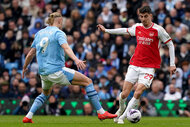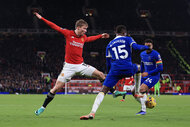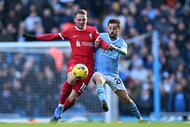Peak Fitness: How The Premier League’s Best Stay In Top Shape
The Premier League schedule can be grueling, meaning any player worth their salt will have a rigorous fitness regime.

To run like a heard of galloping thoroughbreds – averaging seven miles in a Premier League match – requires a bit more training than your beer curls prior to the Thursday night company softball game. EPL match cadence demands players cultivate a near superhuman level of stamina, otherwise a repeated 90-plus minutes of grueling punishment would render them useless after a few games in an already exhausting season. Keeping up with the likes of Cristiano Ronaldo demands players lock into an intense routine, but the prescription for proper footy fitness is a complex puzzle, integrating interval training with high-volume lower body resistance training, adherence to specialized nutrition and regular preventative body care. Easily costing $500,000, a well-rounded, health and fitness regimen is expensive, but to play with the best, one must train like the best.
Let’s Get Physical
Any decent house must have a strong foundation, and when it comes to building elite Premier League players, a strong core comes first. This is where the interval training kicks into high gear, combining high sets of mixed ab work balance with high sets of squats, leg presses and hamstring pulls to ensure a player's legs are always up for what the game demands. Aerobic exercises that target endurance while increasing heart rate and breathing work in tandem with anaerobic exercises, involving short yet acutely strenuous episodes of energy expenditure. Specific exercises like jump squats aim at building explosiveness, while footwork gear like ladders and cones target agility. Working out seven days a week is normal, and pairing those core sessions with three to four days of weight resistance training provides a diverse schedule of cardiovascular exercises. This typically takes the form of seven-vs-seven on one half of the pitch as well as rowing and swimming. In addition to those, Harry Kane incorporates boxing into his training as it’s great for those rapid, short-twitch movements soccer players perform when moving laterally.
Fuel the Machine
The NFL’s DK Metcalf can eat all the Skittles he wants; you won’t find an elite Premier League player scarfing them down any time soon. Having logged more than a decade with Chelsea, sports scientist Armando Vinci says nutrition affects "everything," so disciplined, clean eating is of paramount importance. This begins and ends with the almighty carb. Players pack their meals with a substantial mix of oats, pasta and rice in addition to several carb-heavy snacks like granola and bananas. Players will deplete their glycogen reserves by as much as 250 grams in a single match, so ingesting a broad array of complex carbohydrates is vital to a player’s success. Many invest in private chefs who produce six to eight small meals a day. Players like Ronaldo also consume a robust amount of protein, and for the Portuguese talisman, that equates to tons and tons of fish. The 37-year-old star also never drinks anything alcoholic or carbonated.
TLC – Yes, Please!
A crucial part of reaching and maintaining peak, physical form stems from the actual maintenance. Breaking down accumulating lactic acid is imperative as that can lead to increased fatigue down the line which, in turn, will result in injury. Focusing more often now on recovery has led Manchester City's Kevin De Bruyne to not only use but also invest in Theragun – the handheld, percussive massaging device that’s great at eliminating mild kinks here and there. It’s noninvasive and easy for players to travel with and use at a moment’s notice. Regularly scheduled massages and physio sessions provide more traditional recovery. One of the best, new alternatives that elite Premier League players are turning to in droves is cryotherapy. This form of treatment immerses participants for a couple minutes in an upright chamber or small room that is “chilled” to a brisk minus-150 degrees Celsius. The logic behind the quick freeze is to shock the body and stimulate recovery on the cellular level. Former Tottenham star Gareth Bale is a huge proponent of the treatment.
In a league that usually leaves scant time for is offseason, especially considering national team commitments that many of its players have, competing at the highest of levels in the EPL is a never-ending grind, but aside from an unwavering commitment to one’s physical fitness, there’s also the mental aspect to the game. Developing a focused drive and mental acuity builds confidence in players while enhancing their resilience and ability to self-regulate. One can never discount the precious impact of a quality night’s sleep for both driving physical repair and fortifying mental toughness. As arduous as the dieting and physical training can be, it’s often the mental element that gives any professional athlete the most trouble, including soccer players.
Watch Premier League coverage on USA Network, featuring Premier League Mornings, select matches, and Premier League Goal Zone (check listings for games/schedule). And catch up on all the action on Peacock.













